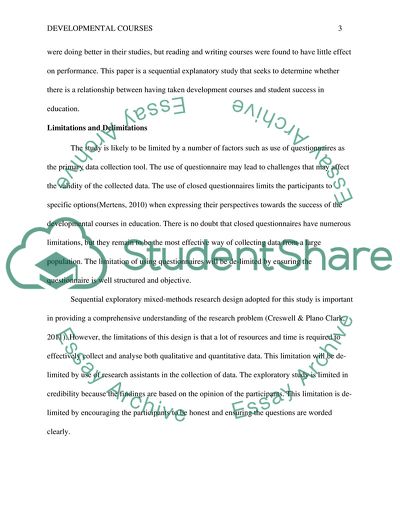Cite this document
(Developmental Courses and Student Success in Education Research Paper Example | Topics and Well Written Essays - 3000 words, n.d.)
Developmental Courses and Student Success in Education Research Paper Example | Topics and Well Written Essays - 3000 words. https://studentshare.org/education/1859152-sequential-explanatory-mixed-method-study-is-to-determine-if-there-is-a-relationship-between-having-taken-developmental-courses-and-student-success-in-education
Developmental Courses and Student Success in Education Research Paper Example | Topics and Well Written Essays - 3000 words. https://studentshare.org/education/1859152-sequential-explanatory-mixed-method-study-is-to-determine-if-there-is-a-relationship-between-having-taken-developmental-courses-and-student-success-in-education
(Developmental Courses and Student Success in Education Research Paper Example | Topics and Well Written Essays - 3000 Words)
Developmental Courses and Student Success in Education Research Paper Example | Topics and Well Written Essays - 3000 Words. https://studentshare.org/education/1859152-sequential-explanatory-mixed-method-study-is-to-determine-if-there-is-a-relationship-between-having-taken-developmental-courses-and-student-success-in-education.
Developmental Courses and Student Success in Education Research Paper Example | Topics and Well Written Essays - 3000 Words. https://studentshare.org/education/1859152-sequential-explanatory-mixed-method-study-is-to-determine-if-there-is-a-relationship-between-having-taken-developmental-courses-and-student-success-in-education.
“Developmental Courses and Student Success in Education Research Paper Example | Topics and Well Written Essays - 3000 Words”. https://studentshare.org/education/1859152-sequential-explanatory-mixed-method-study-is-to-determine-if-there-is-a-relationship-between-having-taken-developmental-courses-and-student-success-in-education.


